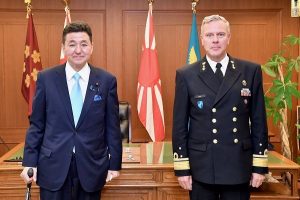Japanese and NATO officials agreed Tuesday to step up military cooperation and joint exercises as they shared concerns that Russia’s invasion of Ukraine is causing a deterioration of the security environment in Europe and Asia.
Japanese Defense Minister Kishi Nobuo said at the beginning of his meeting with NATO Military Committee chief Rob Bauer that Japan hopes to strengthen its ties with European countries and welcomes NATO’s expanded involvement in the Indo-Pacific region.
“The security of Europe and Asia are closely intertwined, especially now with the international community facing serious challenges,” Kishi said.
Bauer’s visit in Tokyo comes as Japan’s Maritime Self-Defense Force is participating in NATO naval exercises in the Mediterranean Sea.
Later Tuesday, Prime Minister Kishida Fumio’s Cabinet approved an annual policy plan that calls for a drastic strengthening of defense capabilities and spending within five years, citing growing tensions involving Taiwan and a commitment by NATO members to spend 2 percent of their gross domestic product on defense — twice as much as Japan’s current military spending of just over 1 percent of GDP.
The plan calls for pre-emptive strike capabilities as well as the development and strengthening of space, cyber, and electromagnetic defense and of unmanned weapons — a major shift that critics say goes beyond Japan’s self-defense-only principle.
Kishida, during a meeting with U.S. President Joe Biden last month, expressed his determination to bolster Japan’s defense capability and spending. The policy paper, the first under Kishida’s eight-month-old government, also covers economic security, energy, and other key issues.
Japan has been increasing its military capabilities and cooperation with Europe, in addition to its alliance with the United States and partnerships with other countries in the Indo-Pacific region and beyond, in the face of China’s rise.
On Tuesday, Japanese and U.S. fighter jets conducted joint flight drills over the Sea of Japan “amid an increasingly severe security environment, such as North Korea’s repeated ballistic missile launches,” Japan’s Defense Ministry announced.
The joint exercise, which involved four Japanese F-15 fighter jets and two U.S. F-16s, was aimed at demonstrating the two militaries’ “strong commitment and close cooperation in responding to any emergency, while further reinforcing the strong alliance,” it said.
Kishida has been invited to the NATO summit later this month, and is reportedly considering attending the meeting, which would make him the first Japanese leader to do so.
In May, Japanese Military Chief of Staff Yamazaki Koji joined a meeting of NATO counterparts in Belgium for the first time.
Bauer praised their increased engagement in tackling “shared security challenges.”
Japan quickly joined the United States and Europe in imposing sanctions against Russia and providing support for Ukraine, saying the crisis affects not only Europe but also could further embolden China to increase its assertiveness in the Indo-Pacific.

































